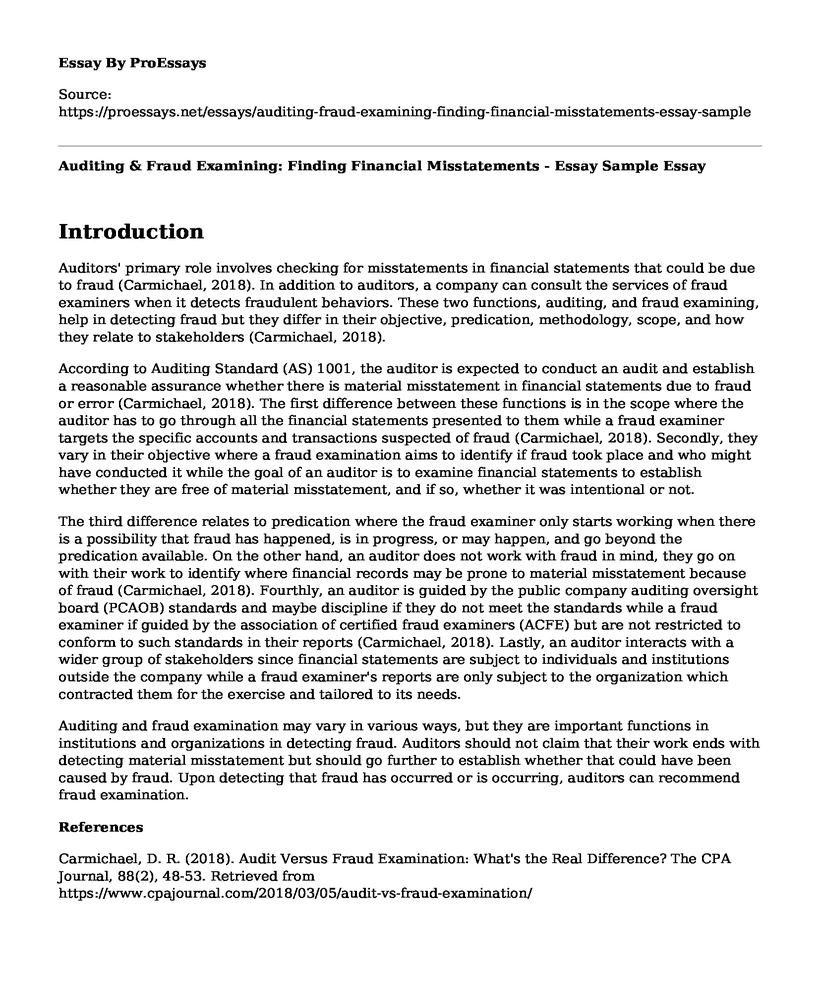Introduction
Auditors' primary role involves checking for misstatements in financial statements that could be due to fraud (Carmichael, 2018). In addition to auditors, a company can consult the services of fraud examiners when it detects fraudulent behaviors. These two functions, auditing, and fraud examining, help in detecting fraud but they differ in their objective, predication, methodology, scope, and how they relate to stakeholders (Carmichael, 2018).
According to Auditing Standard (AS) 1001, the auditor is expected to conduct an audit and establish a reasonable assurance whether there is material misstatement in financial statements due to fraud or error (Carmichael, 2018). The first difference between these functions is in the scope where the auditor has to go through all the financial statements presented to them while a fraud examiner targets the specific accounts and transactions suspected of fraud (Carmichael, 2018). Secondly, they vary in their objective where a fraud examination aims to identify if fraud took place and who might have conducted it while the goal of an auditor is to examine financial statements to establish whether they are free of material misstatement, and if so, whether it was intentional or not.
The third difference relates to predication where the fraud examiner only starts working when there is a possibility that fraud has happened, is in progress, or may happen, and go beyond the predication available. On the other hand, an auditor does not work with fraud in mind, they go on with their work to identify where financial records may be prone to material misstatement because of fraud (Carmichael, 2018). Fourthly, an auditor is guided by the public company auditing oversight board (PCAOB) standards and maybe discipline if they do not meet the standards while a fraud examiner if guided by the association of certified fraud examiners (ACFE) but are not restricted to conform to such standards in their reports (Carmichael, 2018). Lastly, an auditor interacts with a wider group of stakeholders since financial statements are subject to individuals and institutions outside the company while a fraud examiner's reports are only subject to the organization which contracted them for the exercise and tailored to its needs.
Auditing and fraud examination may vary in various ways, but they are important functions in institutions and organizations in detecting fraud. Auditors should not claim that their work ends with detecting material misstatement but should go further to establish whether that could have been caused by fraud. Upon detecting that fraud has occurred or is occurring, auditors can recommend fraud examination.
References
Carmichael, D. R. (2018). Audit Versus Fraud Examination: What's the Real Difference? The CPA Journal, 88(2), 48-53. Retrieved from https://www.cpajournal.com/2018/03/05/audit-vs-fraud-examination/
Cite this page
Auditing & Fraud Examining: Finding Financial Misstatements - Essay Sample. (2023, Mar 10). Retrieved from https://proessays.net/essays/auditing-fraud-examining-finding-financial-misstatements-essay-sample
If you are the original author of this essay and no longer wish to have it published on the ProEssays website, please click below to request its removal:
- Paper Example on Creating an Operating Budget
- Voluntary Income Tax Assistance Essay
- Essay Sample on Experience Filing Taxes for Low-Income People
- Essay on Auditors: Internal and External - Defining Ethics and Financial Records
- Essay Sample on Boeing Credit Card Fraud
- Essay Example on Money Fraud: Madoff Investment Scandal
- Stock Analysis: Essential for Investors & Businesses - Essay Sample







